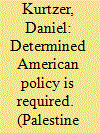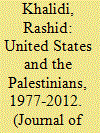|
|
|
Sort Order |
|
|
|
Items / Page
|
|
|
|
|
|
|
| Srl | Item |
| 1 |
ID:
132420


|
|
|
|
|
| Publication |
2014.
|
| Summary/Abstract |
Communicating with the media is an ongoing complicated task intelligence services tackle from the day they are established. The relationship is inherently tense because one side wishes to reveal what the other wishes to conceal, highlighting the constant contradiction between two major principles: the public's right to know versus the government's duty to protect national security. Reconciling these two principles becomes exceedingly complex during crisis situations because both the media and the public demand to know what is happening and why, whereas intelligence services can offer only limited and often incomplete information, a limitation imposed by the need to protect vital secrets. Moreover, the services frequently face a quandary: they are innately secretive and cannot advertise their accomplishments and successes, but these are commonly exposed when they fail. This distorts the natural balance other organizations are generally able to maintain between failures and achievements and any publicity about them.
|
|
|
|
|
|
|
|
|
|
|
|
|
|
|
|
| 2 |
ID:
129795


|
|
|
|
|
| Publication |
2014.
|
| Summary/Abstract |
U.S. Secretary of State John Kerry has done an admirable job of creating an "architecture of peace" to support the negotiations launched in July 2013. He engineered the appointment of retired U.S. General John Allen to delve deeply into Israel's security requirements following a peace treaty, recognizing that the security dilemmas would range far beyond the immediate challenges of securing an Israeli-Palestinian border. Kerry understood that Israel's readiness to take the risks associated with withdrawal from the Occupied Palestinian Territories (OPT) would be influenced directly by the degree to which Israel's security requirements were taken into account.
|
|
|
|
|
|
|
|
|
|
|
|
|
|
|
|
| 3 |
ID:
129796


|
|
|
|
|
| Publication |
2014.
|
| Summary/Abstract |
The signing of the Oslo Accords created a tremendous sense of optimism. The Declaration of Principles signed between the Palestine Liberation Organization (PLO) and the Israeli government in 1993 led to many countries establishing diplomatic relations with Israel, a rise in Israel's GNP, and two productive economic conferences in Morocco and Jordan. One of the memories that best symbolizes this period for me occurred in May 1994: I had been invited to Washington by the president of the United States, and on the plane ride there, the whole cabin approached me with their menus asking me to autograph them. People were really excited, telling me: "This is peace! It's good for both parties." I felt their euphoria. It was a win-win game.
You cannot sign a peace treaty in a win-lose game, while devastating the other party. One only needs to look at what happened to the United States in Afghanistan and Iraq as examples. You don't really achieve a long-term solution with devastating wars. The only way you can build real peace is if it's a win-win situation: through negotiations, conversations and dialogues that lead to agreements which equally - or at least satisfactorily - satisfy both people. When it comes to our situation, I think it's not normal to talk now about permanence in these negotiations. Why? Because the interim agreement has continued for over 20 years. It is now 20 years since we signed the Declaration of Principles and the Oslo Agreement in the White House. So we have lived for 20 years in "interimness," and we have become accustomed to it. But "interimness" is not good for the Palestinians: While we've been in this seemingly never-ending interim time period, the Israeli government has been unilaterally changing the parameters, the terms of reference and the reality on the ground, thereby undermining the basis for a permanent solution.
|
|
|
|
|
|
|
|
|
|
|
|
|
|
|
|
| 4 |
ID:
129797


|
|
|
|
|
| Publication |
2014.
|
| Summary/Abstract |
An outsider observing the Israeli-Palestinian conflict might ask him or herself why, after so many attempts and initiatives have been placed on the negotiations table, the adversaries have failed to reach a settlement. Indeed, the "two-state solution" paradigm has been accepted by the majority of people in both societies for over a decade now (Bar-Tal, Halperin, & Oren, 2010), but the parties appear still far from reaching the desired resolution. Moreover, the solutions proposed over the years of negotiations by both officials and non-officials follow a similar paradigm and have in fact established clear contours to a possible peaceful resolution of the conflict. In fact, the Clinton Parameters from 2001, the Arab Peace Initiative from 2002, and Israeli Prime Minister Ehud Olmert's proposal from 2008 all identify the need to partition the land along the 1967 borders, transfer control of the eastern neighborhoods of Jerusalem to the Palestinians, find a fair solution to Jerusalem's holy sites, and formulate a just and agreed-upon solution to the Palestinian refugee problem (Lavie, 2010). Thus, one might ask: If the solution is so clear, what is holding the parties back?
|
|
|
|
|
|
|
|
|
|
|
|
|
|
|
|
| 5 |
ID:
124267


|
|
|
|
|
| Publication |
2013.
|
| Summary/Abstract |
This essay, based on the author's talk presenting a recent book, Brokers of Deceit: How the U.S. Has Undermined Peace in the Middle East, examines the dynamics of U.S. policy formation on Palestine, mainly through the lens of three "clarifying moments" in the history of U.S. involvement in the Arab-Israeli conflict. The first of these moments concerns efforts to revive and modify the Palestinian autonomy provisions of the 1978 Camp David Accords as an element of the 1982 Reagan Plan. The second examines Israeli-U.S. connivance during 1991-93 Madrid/Washington Palestinian-Israeli negotiations as revealed in confidential documents, and the third focuses on President Barack Obama's retreat during the second half of his first term from positions staked out earlier. More generally, the essay looks at the underpinnings and continuity of U.S. policy and how it has evolved.
|
|
|
|
|
|
|
|
|
|
|
|
|
|
|
|
|
|
|
|
|